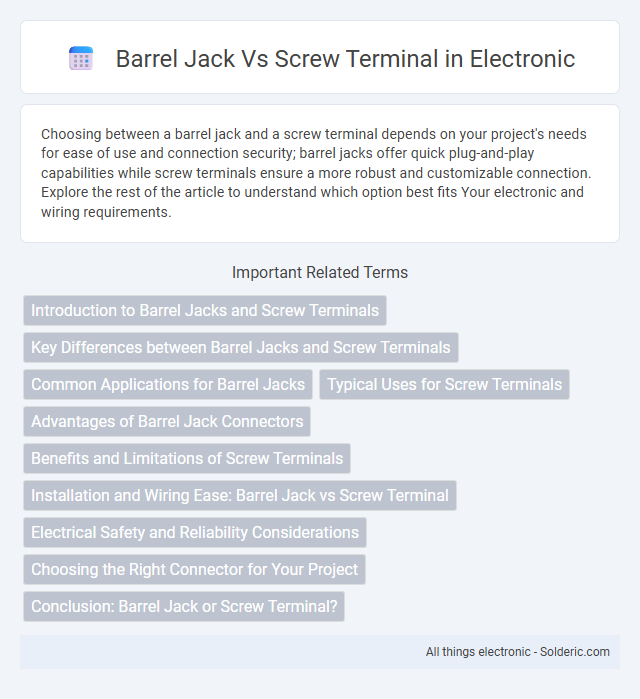Choosing between a barrel jack and a screw terminal depends on your project's needs for ease of use and connection security; barrel jacks offer quick plug-and-play capabilities while screw terminals ensure a more robust and customizable connection. Explore the rest of the article to understand which option best fits Your electronic and wiring requirements.
Comparison Table
| Feature | Barrel Jack | Screw Terminal |
|---|---|---|
| Connection Type | Plug-in, cylindrical connector | Wire secured by tightening screws |
| Installation | Quick, tool-free | Requires screwdriver |
| Current Capacity | Typically up to 5A | Varies; often supports higher currents (up to 15A+) |
| Reliability | Moderate; can loosen with vibration | High; strong mechanical bond |
| Use Case | Power input for consumer electronics | Industrial, DIY, and custom wiring |
| Maintenance | Low; plug/unplug easy | Requires periodic screw tightening |
| Size | Compact | Bulkier due to terminal block |
| Cost | Generally low-cost | Variable; medium cost |
Introduction to Barrel Jacks and Screw Terminals
Barrel jacks and screw terminals serve as common connectors in electronic circuits, each offering unique advantages for power and signal connections. Barrel jacks provide a quick and secure connection typically used for low-voltage DC power supply, characterized by a cylindrical socket and plug design. Screw terminals offer versatile wire attachment through clamping by screws, enabling easy customization and robust mechanical stability in various wiring applications.
Key Differences between Barrel Jacks and Screw Terminals
Barrel jacks provide a quick and reliable plug-and-play power connection commonly used in consumer electronics, featuring a cylindrical design that mates with a matching plug for easy insertion. Screw terminals offer a secure and customizable wiring solution by clamping bare wires or cables, ideal for applications requiring strong mechanical retention and flexible conductor sizes. The key difference lies in barrel jacks being designed for standardized, detachable connectors, while screw terminals emphasize direct wire attachment and durability in industrial or prototyping contexts.
Common Applications for Barrel Jacks
Barrel jacks are commonly used in low-voltage DC power supply connections for devices such as laptops, routers, and LED lighting systems due to their ease of use and reliable contact. Their popularity in consumer electronics and small appliances stems from the quick plug-and-play design, which minimizes installation time and reduces the risk of improper wiring. When choosing your power connector, barrel jacks offer a standardized solution ideal for portable electronics requiring efficient power delivery.
Typical Uses for Screw Terminals
Screw terminals are commonly used for securely connecting wires in electrical installations like control panels, junction boxes, and industrial machinery. Their design allows for easy adjustments, reliable grounding, and a strong mechanical connection in environments needing frequent wiring changes or high current capacity. Your projects benefit from screw terminals when requiring robust, reusable, and maintenance-friendly wiring solutions.
Advantages of Barrel Jack Connectors
Barrel jack connectors offer quick and reliable power connections with minimal installation time, making them ideal for consumer electronics. They provide standardized sizes, ensuring compatibility across various devices and power supplies, which enhances user convenience. Their durable design resists wear and tear, promoting longer device lifespan in comparison to screw terminals.
Benefits and Limitations of Screw Terminals
Screw terminals offer secure and reliable electrical connections by clamping wires tightly, reducing the risk of disconnection in vibrations or movement. Their versatility supports various wire sizes and types, making them ideal for customization and easy troubleshooting in complex wiring setups. However, screw terminals require manual tightening, which can be time-consuming and prone to errors if not properly secured, potentially leading to loose connections or electrical faults in your projects.
Installation and Wiring Ease: Barrel Jack vs Screw Terminal
Barrel jacks offer quick plug-and-play installation, ideal for users seeking hassle-free connection without tools, ensuring reliable polarity and reduced wiring errors. Screw terminals require manual wire insertion and tightening, providing greater flexibility for custom or bare-wire connections but demanding more time and precision during installation. Barrel jacks simplify wiring for standardized adapters, while screw terminals enable versatile setups in diverse electrical applications, balancing convenience against customization.
Electrical Safety and Reliability Considerations
Barrel jacks provide secure, standardized connections that minimize accidental disconnections and reduce electrical hazards, making them ideal for low-voltage devices. Screw terminals offer robust mechanical fastening and accommodate a variety of wire sizes, enhancing reliability but require careful tightening to prevent loose connections that can cause arcing or short circuits. Ensuring proper installation and maintenance of your chosen connector type is crucial to maintaining electrical safety and system reliability.
Choosing the Right Connector for Your Project
Selecting the right connector for your project depends on factors like ease of installation, durability, and power requirements. Barrel jacks provide a quick plug-and-play solution ideal for low-voltage DC power, while screw terminals offer secure, customizable wiring for higher current applications and frequent disconnections. Consider voltage ratings, current capacity, and connection security to ensure compatibility and safety in your design.
Conclusion: Barrel Jack or Screw Terminal?
Barrel jacks provide quick and reliable connections ideal for standard power supply setups, while screw terminals offer secure, customizable wiring suited for flexible and heavy-duty applications. Choosing between a barrel jack and screw terminal depends on the specific project requirements, such as ease of use, durability, and current capacity. For rapid prototyping or consumer electronics, barrel jacks are preferred; for industrial or permanent installations requiring robust connections, screw terminals are more suitable.
Barrel Jack vs Screw Terminal Infographic

 solderic.com
solderic.com